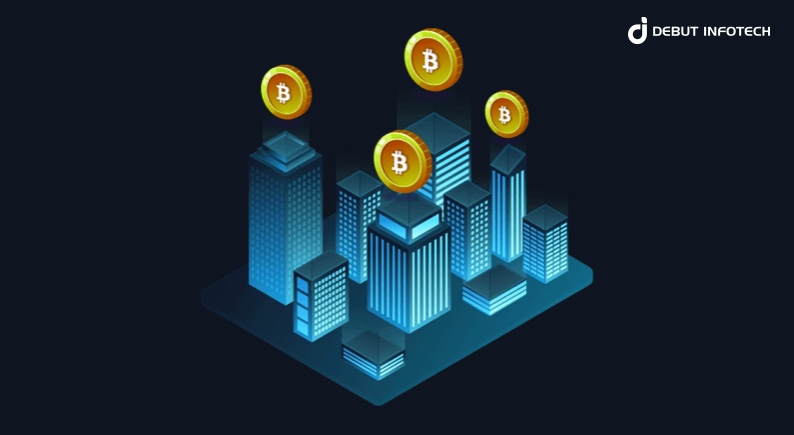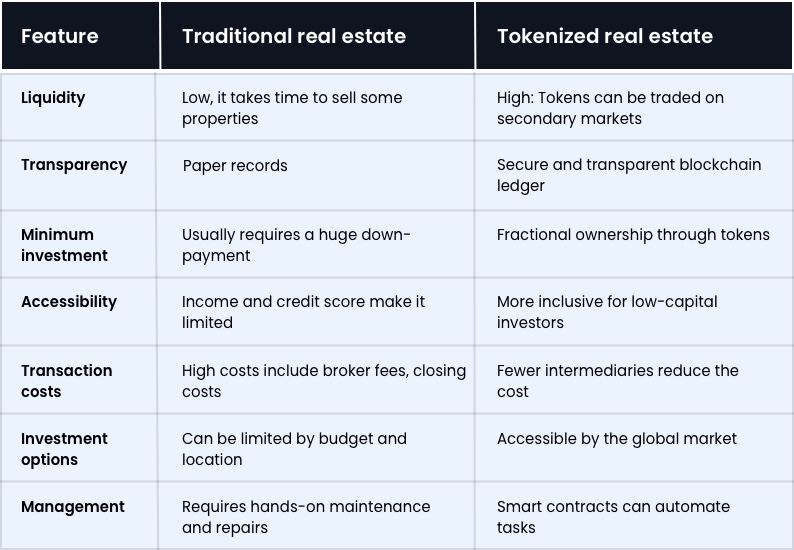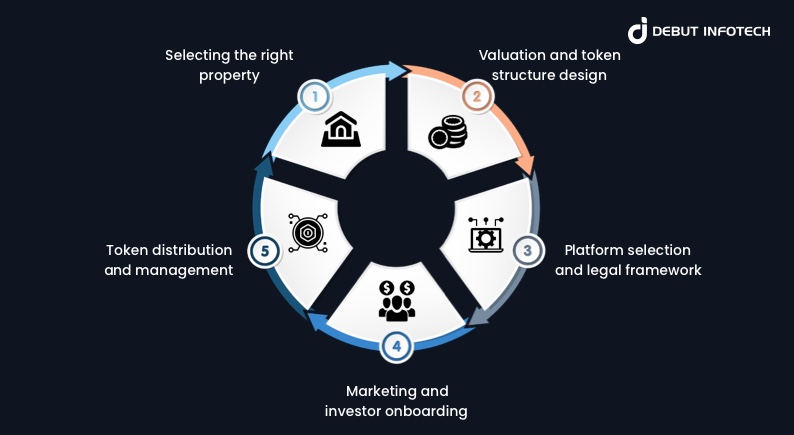Table of Contents
Home / Blog / Blockchain
How Real Estate Tokenization Works: A Step-by-Step Guide
June 19, 2024

June 19, 2024
For many years, investors seeking stability and long-term profits have turned to real estate, which is typically regarded as a reliable and tangible investment. However because it adhered to traditional methods, the sector has frequently been seen as inaccessible and opaque, particularly by small-scale investors. The tokenization of real estate is a revolutionary solution brought about by the introduction of blockchain technology. This novel strategy not only makes real estate investing more accessible but also brings record-breaking liquidity to a traditionally restricted market.
Real estate tokenization is essentially the act of turning ownership stakes or property rights into digital tokens on a blockchain. Similar to corporate stocks, these tokens enable for easier and more flexible purchasing, selling, and trading because they reflect a fractional portion of real estate assets. Tokenization uses blockchain technology to guarantee these transactions’ security, transparency, and immutability—features that were previously difficult to apply in conventional real estate transactions.
Blockchain: A Real Estate Catalyst for Change
An encrypted and decentralized ledger system is provided by blockchain technology, which forms the basis of tokenization. All transactions are recorded, rendering them impervious to tampering and readily verifiable. By eliminating the need for conventional middlemen like banks and real estate brokers, this technology drastically lowers prices and streamlines procedures. The advent of smart contracts, which are self-executing agreements with the terms of the deal explicitly encoded in code, further automates and enforces transactional processes, such as property transfers and escrow, lowering the possibility of disagreements and mistakes.
The Broader Impact
The tokenization of real estate has broad ramifications. Because of the decreased entrance barrier, small investors can now participate in real estate markets that were previously inaccessible to them because of large capital requirements. Additionally, it makes the real estate market more liquid, making it simpler for investors to sell tokens on secondary markets and turn their holdings into cash. The enhanced security and transparency of blockchain transactions, along with its flexibility, make real estate tokenization an innovative advancement that has the potential to completely transform the real estate investment market.
The article analyzes the mechanics of real estate tokenization in further detail and looks at its potential applications going forward in the parts that follow. The objective is to offer a thorough grasp of this ground-breaking combination of technology and real estate, which has the potential to completely alter the standards for both property ownership and investment.
Importance of Real Estate Tokenization

Transforming the Investment Landscape
The tokenization of real estate represents a fundamental change in the real estate investing industry. Tokenization has the potential to drastically change how people and entities engage with real estate as an asset class by removing long-standing obstacles and bringing a degree of flexibility never seen in this industry before.
10 Benefits of Real Estate Tokenization
The financial landscape is transformed by real estate tokenization, which opens up a wealth of benefits. These ten main advantages confirm its revolutionary potential:
1. Global Investment Access: Ignore regional borders. With tokenization, you can purchase real estate anywhere in the world, from booming metropolises to peaceful island getaways. With the use of a safe and open internet platform, you might potentially draw in investors from Asia for your Caribbean vacation home or from Europe for your New York City business. By spreading out your investments over several continents, you can take advantage of fascinating opportunities that go beyond regional markets.
2. Fractional Ownership: In contrast with traditional techniques, tokenization provides a greater variety of fractional ownership. As a result, investors can adjust their portfolios to fit their risk tolerance and budget. You have the option of investing in a small token that represents a portion of a commercial building or buying many tokens for a larger investment in a residential development project.
3. Instant Liquidity: Traditionally, selling a property can be difficult and time-consuming. This is resolved via tokenization, which gives your asset access to a ready-made secondary market. Like stock markets, these digital tokens can be exchanged on specialized platforms, enabling owners to profitably and swiftly from their investment. A larger pool of possible purchasers becomes accessible due to the greater liquidity, which could result in quicker sales and possibly better valuations.
4. Reduce Transaction Costs: Smart contracts and blockchain technology automate procedures, doing away with the need for banks, brokers, and attorneys. They eliminate middlemen and their exorbitant commissions by automating processes like rent distribution and collection. These smart contracts can drastically lower the administrative load and related expenses on property owners. As a result, your investment returns will increase and transaction costs will be greatly reduced.
5. Increased Transparency: Tokenized real estate is based on blockchain technology, which guarantees safe and open transactions. Investors can easily access ownership records and transaction histories by viewing the blockchain ledger. As a result, there is less chance of fraud and the investment ecosystem is more trusted.
6. Connect with a larger network of investors by joining the Global Investor Network. Real Estate tokenization platforms establish global communities that promote cooperation and information exchange. Get access to a variety of viewpoints and global investing expertise.
7. Automated Management: Do away with time-consuming paperwork and follow up on rent payments. By automating processes like rent distribution and collection, smart contracts guarantee prompt and clear payments. Enjoy the hassle-free passive income by reclining back.
8. Accessible Financing: There are now more options for funding. Multiple investors can contribute to the financing of a property acquisition through fractionalized lending. This promotes greater financial inclusion by providing opportunities to individuals who would not be eligible for conventional loans.
9. Regulatory Compliance: Easily follow the rules. Smart contracts can be configured to automatically abide by pertinent laws, which lessens the workload for issuers and investors alike. Invest more time in strategic investments and less time in paperwork.
10. Eco-Friendly Investing: Make a financial investment in a future with less pollution. Tokenization can help finance environmentally conscious and sustainable real estate projects, encouraging ethical development and having a beneficial effect on the environment.
These are only a few advantages. Expect many more fascinating opportunities as tokenization progresses, revolutionizing our interactions with and investment in the real estate market. So fasten your seatbelts and get ready to take on this revolutionary force!
Democratization of Real Estate Investments
Tokenization is a social as well as technological innovation. It democratizes real estate investing by removing borders and offering a platform for modest investments. This democratization could lead to a more equitable redistribution of income and investment possibilities, promoting an inclusive economy.
The wider economy may benefit from the enhanced efficiency and liquidity that real estate tokenization brings about. Increased spending, saving, and investing in other areas could result from more individuals being able to purchase real estate and reap the financial rewards, which would propel overall economic growth.
How Real Estate Tokenization Works
Blockchain technology, a decentralized digital ledger that logs transactions across numerous computers, is the foundation of real estate tokenization. This makes sure that changing the record in the past will need changing all blocks that come after it and the network’s consensus. This technology is used in the real estate industry to generate digital tokens for ownership or shares of real estate assets.
Traditional real estate vs tokenized real estate
So how do tokenized and traditional real estate strategies compare? Let’s examine the main variations in this helpful comparison table in more detail.

Types of Tokenized Real Estate
We’ll examine two well-known categories: fractional ownership and simple tokenization, stressing the tremendous prospects they bring, especially for enterprises, as well as their distinctive structures.
Simple Tokenization
This type of tokenization allows holders to have sole ownership of an individual or a group of digital assets. This can be likened to owning the deed to a landed property or a piece of a prized possession. This can be broken down in this way:
Structure:
One high-value asset is tokenized into a single NFT, such as a five-star hotel, a landmark structure, or a prominent commercial area. The whole ownership of the underlying asset is represented by this special token.
Features:
- Exclusivity: Owning the sole NFT grants unparalleled bragging rights and the potential for significant future value appreciation.
- Direct control: The token holder enjoys complete decision-making power regarding the property’s management and potential sale.
- Investment potential: NFTs representing iconic properties can be highly valuable collectibles, attracting investors seeking a unique asset class with high-growth potential.
Fractional Real Estate
Fractional ownership elevates the concept of democratization to a new level. Let’s see what it comprises:
Structure:
Several digital tokens, each denoting a portion of the total ownership, are allocated to a real estate asset. When compared to more conventional ways, this enables investors to own a portion of a valuable property for a substantially lower price.
Features:
Wider outreach: A larger audience, including smaller investors, can now engage in real estate investment thanks to fractional ownership.
Increased liquidity: Compared to traditional real estate, fractional tokens provide investors more flexibility and speedier exit opportunities because they can be sold on secondary markets like equities.
Passive income: Even with a lesser ownership interest, token holders can profit passively from the property’s rental yields.
Technical Challenges of Real Estate Tokenization
Here’s a breakdown of the key challenges that real estate tokenization currently faces:
Scalability
Even if they are secure, current blockchain systems frequently have scalability issues. Imagine tokenizing a complex of high-rise apartments. The blockchain must be able to manage an enormous amount of data if each apartment is equivalent to hundreds or thousands of tokens. While scaling solutions evolve constantly for widespread adoption, reliable and effective transaction processing is essential.
Interoperability
The state of blockchain technology is fragmented now, with several platforms adhering to distinct protocols and standards. It may be challenging for tokenized assets issued on one platform to communicate with another platform without difficulty because of this lack of interoperability. It is analogous to listing your tokenized beach property on a secondary market where the original platform’s token standard is not recognized. Creating standards for interoperability between various blockchains is essential to creating a cohesive and effective ecosystem.
Securities classification
It’s still unclear how tokenized real estate should be categorized following current securities laws. Do they adhere to stricter financial restrictions, or are they only digital depictions of property? To guarantee market stability and investor safety, regulatory organizations must provide clarification.
Unforeseen consequences
Smart contract code has to be carefully written and extensively tested. The tokenization process could be compromised by even one incorrect line of code, leading to unexpected outcomes. To ensure that smart contracts are executed smoothly, strict development protocols, thorough testing, and smart contract audit procedures are essential.
Pricing issues
It can be difficult to ascertain a tokenized property’s fair market worth. The digital world may not fully accommodate traditional valuation techniques, which could result in differences between the token price and the value of the underlying asset. For investors to feel confident, trustworthy norms for tokenized real estate valuation must be established.
Limited market depth
The secondary markets for tokenized assets are still in their infancy, despite the possibility of more liquidity. The number of buyers and sellers may be limited at first, which could affect how quickly and easily transactions can be completed. Establishing a strong environment for secondary markets is crucial to provide long-term liquidity.
How To Tokenize Real Estate

Step 1: Selecting the right property
Any successful tokenization project must begin with the property. Here are some crucial things to remember:
- Market inclination: Select a property that has good chances for capital growth or rental income.
- Adherence to regulations: Make sure the location and kind of property abide by the rules currently in place for tokenized real estate.
- Potential liquidity. Take into account variables that may affect how simple it is to purchase and sell tokens on secondary marketplaces.
- Tax and legal consequences. To learn about the effects of tokenization on ownership structures and any tax liabilities, consult an expert in law and taxation.
Step 2: Valuation and token structure design
After the property has been chosen, the next steps are to build the token structure and ascertain its value:
- Expert appraisal: To find the property’s fair market value, hire a certified appraiser.
- Ratio of tokenization: Determine the total number of tokens that will represent the property.
- Rules and rights for tokens: Specify the rights that come with each token, such as the ability to vote on choices about the management of the property or a portion of the rental money.
Step 3: Platform selection and legal framework
Setting up a legal framework and selecting the appropriate Real Estate tokenization platform are essential steps:
- The platform for tokenization: Choose a trustworthy blockchain for real estate platform that supports tokenization of real estate.
- Creation of smart contracts: Create a safe smart contract that manages every step of the transaction, from transferring ownership to issuing tokens to distributing possible rental money.
- Legal records: Collaborate with legal experts to draft thorough legal documentation that describes the rights and obligations of investors as well as the offering structure.
Step 4: Marketing and investor onboarding
After the foundation is in place, it’s time to draw in investors:
- Marketing strategy: Create a focused marketing strategy to connect with possible tokenized real estate investors.
- Compliance requirements: Make sure you are adhering to any local laws about investor onboarding and marketing.
- The process of onboarding investors: Simplify the onboarding process for investors to make it simple for them to register, buy tokens, and store their digital assets safely.
Step 5: Token distribution and management
It’s time to manage the property and distribute tokens after the fundraising phase is over:
- Distribution of tokens: Allocate tokens to investors in proportion to their investment in the offering.
- Administration of properties: Provide a detailed strategy detailing who is responsible for maintenance, how rent is collected, and how rental income might be distributed among token holders.
- Constant communication: Keep lines of communication open with token holders by giving frequent updates on the functioning of the property and any pertinent decisions pertaining to the asset.
Conclusion
The emergence of real estate tokenization is going to change the face of investing. It provides a more approachable, effective, and globally integrated real estate investing method. Gaining knowledge about tokenizing real estate will help a larger group of investors gain access to the real estate market and create new investment opportunities. We can anticipate even greater uptake and creativity as laws become more firmly established and technology advances, opening the door to a future for real estate ownership that will genuinely revolutionize.
Are you prepared to begin your tokenization project for real estate? Speak with Debut Infotech, a leading real estate tokenization company with extensive industry knowledge. Speak with us right now to go over your needs!
Talk With Our Expert
Our Latest Insights
USA
Debut Infotech Global Services LLC
2102 Linden LN, Palatine, IL 60067
+1-708-515-4004
info@debutinfotech.com
UK
Debut Infotech Pvt Ltd
7 Pound Close, Yarnton, Oxfordshire, OX51QG
+44-770-304-0079
info@debutinfotech.com
Canada
Debut Infotech Pvt Ltd
326 Parkvale Drive, Kitchener, ON N2R1Y7
+1-708-515-4004
info@debutinfotech.com
INDIA
Debut Infotech Pvt Ltd
Sector 101-A, Plot No: I-42, IT City Rd, JLPL Industrial Area, Mohali, PB 140306
9888402396
info@debutinfotech.com



Leave a Comment